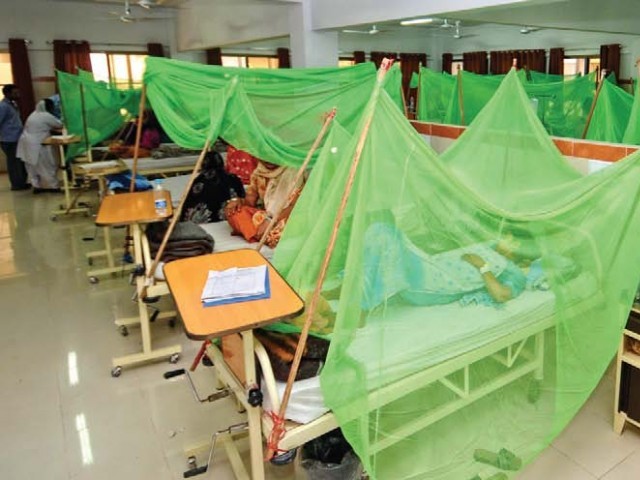ISLAMABAD – Around 49,938 persons have been infected by Dengue in the country during the last four years, of which 107 lost their precious lives because of this fatal disease.
Of the total, 3930 were affected in Islamabad, 6058 in Punjab, 10447 in Sindh, 28,298 in Khyber Pakhtunkhwa (KPK), 139 in Balochistan, 398 in Azad Jammu and Kashmir (AJK), and 668 in Federally Administered Tribal Areas (FATA) while no data was available for Gilgit-Baltistan (GB).
The year-wise data of provinces issued by National Health Services Division on Friday showed that in Punjab 2912 persons were affected by Dengue during 2015, 2591 in 2016, 508 in 2017 and 47
in 2018.
In Islamabad, 526 persons were affected by Dengue during 2015, 2813 in 2016, 296 in 2017 and 295 in 2018.
Similarly, in Sindh, 3962 persons were affected by Dengue during 2015, 2418 in 2016, 2927 in 2017 and 1140 2018.
In KPK, 2,277 persons were affected by Dengue fever during 2015, 685 in 2016, 24,938 in 2017 and 398 in 2018 while in Balochistan during 2015, 36 persons were affected by Dengue while no data was available for 2016, 82 in 2017 and 21 in 2018.
In Azad Jammu and Kashmir during 2015, one person was affected by Dengue, 388 in 2016, 5 in 2017 and 4 in 2018. In FATA no data available for 2015 and 2016 while 406 persons were affected by the disease during 2017 and 262 in 2018.
The year-wise data regarding mortality by Dengue showed that 107 persons became victims of this disease during the last four years, out of which six registered in Islamabad, 14 in Punjab, 17 in Sindh and 70 in KPK. No data was available from Balochistan, GB, AJK, and FATA.
Meanwhile, National Institute of Health (NIH), Ministry of National Health Services has established a well-equipped Disease Surveillance and Response Units (DSRUs) in provinces for prevention and control of Dengue and Congo fevers.
The Units have been established in collaboration with Field Epidemiology and Laboratory Training Program (FELTP) in Directorate General of Health Services in provinces, Azad Jammu and Kashmir (AJK), Gilgit Baltistan (GB), FATA and Karachi.
Trained workforce along with FELTP trainees are available at all DSRUs to conduct outbreak investigations, respond to diseases and collect surveillance data.
When contacted, official sources highlighted steps and said NIH has strengthened collaboration mechanism and is providing technical support as and when requested by the provincial
governments.
The NIH has also established “One Health Hub” and is closely working with the Veterinary Department and Environmental Health Department to strengthen the timely response to zoonotic and vector-borne diseases.
The Institute has shared Integrated Vector Management (IVM) guidelines with all relevant stockholders while information, education, and communication (IEC) material also developed on both diseases and disseminated to all province.
It is establishing Provincial Public Health Reference Labs at all provinces which will help in the diagnosis of these diseases at their provincial level.
Routinely conducting different pieces of training on the epidemiology of diseases, sample collection, handling, preservation and transportation, safe biosafety practices, vector control and management, infection prevention and control measures, and clinical case management.
The NIH with the consensus of provincial health departments and relevant stakeholders has drafted a National Action Plan for prevention and control of Dengue in the country and distributed to
stakeholders for their inputs.
NIH has established first-ever Vector-Borne and Zoonotic lab where free of cost diagnostic and vector identification facilities are available.
Based on decisions during training workshop, a booklet on Dengue case management has been published with the support of WHO and is in process of distribution to physicians
and hospitals.
Dengue National Action Plan has been prepared by NIH and the Ministry and shared with provinces.
Short dengue case management, assessment, and management tool have been shared with all provincial health departments. Provincial Governments are implementing measures for vector surveillance and control which needs to be enhanced during the current high transmission season.
The sources said health professionals and authorities are regularly sensitized through Seasonal Awareness and Alert Letters (SAAL) and both diseases are posted as High Alert.
Advisory regarding prevention and control of Congo virus has been issued to all concerned in August 2018.
National Guidelines on Dengue and Congo virus are available at NIH website for ready reference.













